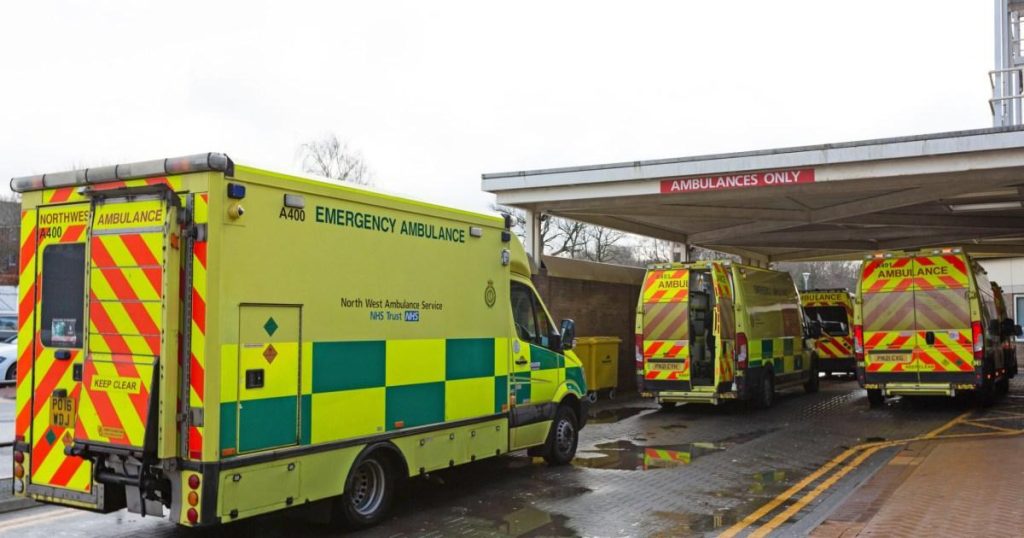A Nurse’s Struggle for Life: Unfolding the Events of a Hospital Stabbing
The tranquility of Royal Oldham Hospital was shattered on a seemingly ordinary night when a nurse, diligently attending to her duties in the emergency department, became the victim of a brutal attack. At approximately 11:30 pm, the hospital descended into chaos as a man assaulted the nurse with a sharp instrument, the nature of which remains undisclosed, but confirmed not to be a knife. This shocking incident sent ripples of fear and concern throughout the hospital and the wider community.
Greater Manchester Police (GMP) swiftly responded to the scene, classifying the incident as "serious." Preliminary investigations suggest that the assailant, a member of the public, targeted the nurse specifically. The victim, a woman in her 50s, sustained severe injuries that are deemed "life-changing," leaving her in critical condition and battling for her life.
Law enforcement authorities acted decisively, apprehending a 37-year-old man on suspicion of attempted murder. While the motive behind the attack remains under investigation, police have confirmed that they are not seeking any other suspects. The arrested individual remains in custody, undergoing questioning as the investigation progresses.
The incident has understandably caused significant distress and concern within the hospital and the local community. Detective Sergeant Craig Roters of GMP’s Oldham district expressed his sympathies for the victim, her family, and colleagues, assuring them of continued support throughout the investigation. He also acknowledged the unsettling nature of the incident and reassured the community of an increased police presence, not only to facilitate inquiries but also to offer comfort and address any concerns.
This attack on a dedicated healthcare professional highlights the inherent vulnerabilities faced by those working on the front lines of medical care. Nurses, doctors, and other healthcare workers often find themselves in challenging situations, dealing with individuals under stress or experiencing mental health crises. While hospitals strive to maintain safe environments, the potential for unforeseen acts of violence remains a constant concern.
The incident at Royal Oldham Hospital underscores the urgent need for enhanced security measures in healthcare settings. Hospitals are places of healing and refuge, and it is imperative that staff and patients feel safe within their walls. This necessitates a comprehensive approach, encompassing robust security protocols, improved staff training in de-escalation techniques, and readily available mental health support for both staff and patients.
The Ripple Effect: Impact on Healthcare Workers and the Community
The attack on the nurse has reverberated throughout the healthcare community, leaving colleagues and fellow professionals in a state of shock and disbelief. The incident serves as a stark reminder of the risks faced by those dedicated to caring for others, often in demanding and unpredictable circumstances. It also highlights the emotional toll that such events can take on healthcare workers, who may experience fear, anxiety, and a sense of vulnerability in the aftermath.
The impact extends beyond the hospital walls, affecting the broader community as well. Such acts of violence erode public trust and create a sense of unease. The incident at Royal Oldham Hospital underscores the importance of fostering a culture of respect and appreciation for healthcare professionals, recognizing the vital role they play in society.
The Need for Enhanced Security Measures in Healthcare Settings
The attack on the nurse raises critical questions about the adequacy of security measures in hospitals and other healthcare facilities. While hospitals typically have security protocols in place, this incident highlights the need for continuous review and improvement. This may involve increased security personnel, enhanced surveillance systems, and improved access control measures.
Furthermore, staff training in de-escalation techniques and conflict resolution can play a crucial role in preventing or mitigating violent incidents. Equipping healthcare workers with the skills to effectively manage challenging situations can significantly enhance their safety and well-being. Regular drills and simulations can also help prepare staff for potential emergencies and ensure a coordinated response.
The Importance of Mental Health Support
The incident also underscores the importance of providing adequate mental health support for healthcare workers. Exposure to traumatic events, such as witnessing or experiencing violence, can have profound psychological consequences. Hospitals and healthcare organizations must prioritize the mental well-being of their staff, offering access to counseling services, stress management programs, and other resources.
Equally important is the provision of mental health services for patients and visitors. Individuals experiencing mental health crises may pose a risk to themselves or others. Ensuring access to appropriate mental health care within the hospital setting can help prevent such incidents and create a safer environment for everyone.
Building a Culture of Respect and Appreciation
Beyond security measures and mental health support, fostering a culture of respect and appreciation for healthcare professionals is crucial. Nurses, doctors, and other healthcare workers dedicate their lives to caring for others, often under challenging circumstances. Recognizing their contributions and treating them with respect is essential to creating a positive and safe working environment.
This includes addressing workplace violence, implementing zero-tolerance policies, and providing adequate support for victims. It also requires educating the public about the importance of respecting healthcare professionals and the vital role they play in society.
Moving Forward: Lessons Learned and a Call for Change
The attack on the nurse at Royal Oldham Hospital serves as a wake-up call for the healthcare community and society as a whole. This tragic incident underscores the need for enhanced security measures, improved mental health support, and a renewed commitment to fostering a culture of respect and appreciation for healthcare professionals. By learning from this incident and implementing necessary changes, we can strive to create safer healthcare environments for all.











